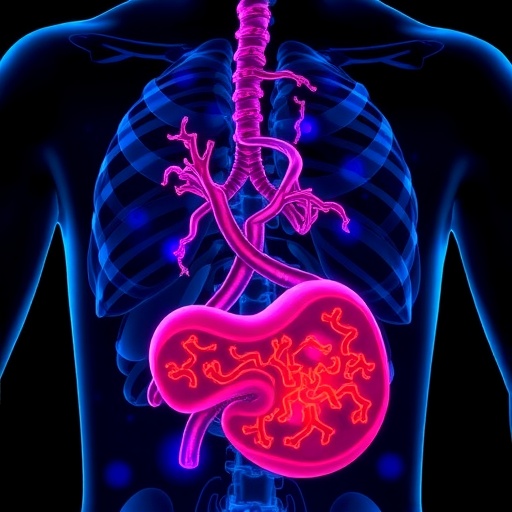In the ever-evolving landscape of cancer research, a recent study sheds light on the intricate relationship between BCL2L12 and the immune status of hepatocellular carcinoma (HCC). Researchers led by Niu, Cao, and Lian delve into the oncogenic properties of BCL2L12, a member of the BCL-2 family of proteins, emphasizing its pivotal role in the prognosis of HCC. This comprehensive investigation merges the fields of oncology and immunology, revealing novel insights into cancer progression and treatment outcomes.
The study is predicated on the grim reality of HCC, which is the most prevalent form of liver cancer and a leading cause of cancer-related deaths worldwide. The prognosis for patients diagnosed with HCC remains poor, primarily due to late-stage presentations and limited therapeutic options. Identifying biomarkers that could predict outcomes and guide treatment strategies is of paramount importance. In this context, the researchers suspect that BCL2L12 may influence not just tumor development but also the body’s immune response to cancer.
BCL2L12, an anti-apoptotic protein, has garnered attention in recent years for its involvement in various cancers, including breast and lung cancer. However, its explicit role in HCC has remained largely underexplored until now. This research provides an in-depth analysis of how BCL2L12 modulates immune signaling pathways and its potential impact on tumor microenvironment dynamics. By examining tumor samples and correlating BCL2L12 expression with immune cell infiltration, the research team sought to uncover the protein’s influence on the immune landscape.
The findings indicate that elevated levels of BCL2L12 are associated with a profound alteration in the immune microenvironment surrounding HCC tumors. Specifically, tumors expressing higher BCL2L12 levels showed a reduced presence of cytotoxic T cells and an increased accumulation of regulatory T cells. This shift in immune cell populations suggests that BCL2L12 not only promotes cancer cell survival but may also actively suppress the body’s immune response against the tumor. Such insights are crucial for understanding how tumors evade immune surveillance, which is a hallmark of cancer progression.
Moreover, the research highlights the correlation between BCL2L12 expression and various immune checkpoint molecules. Immune checkpoints, like PD-1 and CTLA-4, are critical in regulating immune responses. The study found that BCL2L12 expression levels inversely correlated with the expression of these checkpoints, suggesting that tumors with high BCL2L12 may deter effective immune responses by upregulating these checkpoints. This discovery could have significant implications for immunotherapy approaches, as tumoral BCL2L12 levels might serve as a biomarker to predict patient response to treatments that target these immune checkpoints.
In addition to exploring the relationship between BCL2L12 and immune cells, the study also investigates the downstream signaling pathways activated by BCL2L12 in HCC. The research team discovered that BCL2L12 engages specific pathways that enhance tumor proliferation and survival. Understanding these molecular mechanisms is vital for devising novel therapeutic strategies that can specifically target BCL2L12 and disrupt its oncogenic functions. By elucidating the underlying pathways that BCL2L12 manipulates, researchers can identify potential drug targets to enhance treatment efficacy.
To contextualize their findings, the researchers also compared the BCL2L12 expression profiles of HCC patients with different clinical outcomes. Their analysis revealed a striking association between high BCL2L12 levels and poorer overall survival rates. This data underscores the potential of BCL2L12 as a prognostic biomarker for HCC, providing valuable information to guide clinical decision-making. Patients showing high BCL2L12 expression may benefit from intensified monitoring and more aggressive treatment regimes.
To translate their laboratory findings into clinical relevance, the researchers propose several future directions. Firstly, they suggest conducting larger scale studies to validate BCL2L12 as a biomarker across diverse patient populations. Additionally, they recommend exploring the therapeutic targeting of BCL2L12 as a novel approach to enhance the efficacy of existing cancer therapies. Given the challenging landscape of HCC management, such strategies could provide new avenues for improving patient outcomes.
Public engagement and raising awareness about the findings of this study are also emphasized. As the implications of BCL2L12 as both an oncogene and a modulator of immune status unfold, disseminating this knowledge can empower patients and healthcare providers alike. By understanding the molecular underpinnings of HCC, stakeholders can advocate for better screening, timely diagnosis, and more tailored treatment strategies.
In summary, the research conducted by Niu, Cao, Lian, and colleagues provides essential insights into the role of BCL2L12 in hepatocellular carcinoma. Their findings pinpoint the dual role of this protein in promoting malignancy while simultaneously manipulating the immune microenvironment. Such revelations significantly contribute to the growing body of knowledge surrounding HCC, setting the stage for future investigations aimed at improving survival rates for patients afflicted with this devastating disease. As the battle against cancer continues, studies like these are instrumental in uncovering critical mechanisms that can ultimately lead to more effective treatments.
In conclusion, the investigation into BCL2L12 and its association with immune status in HCC underscores the importance of interdisciplinary approaches in cancer research. By intertwining the fields of molecular oncology and immunology, researchers can develop a more robust understanding of cancer dynamics. This research not only enhances our comprehension of hepatocellular carcinoma but also lays the groundwork for innovative therapeutic strategies and improved patient prognostication going forward.
Subject of Research: The oncogenic role of BCL2L12 associated with immune status in the prognosis of hepatocellular carcinoma.
Article Title: The oncogenic role of BCL2L12 associated with immune status in the prognosis of human hepatocellular carcinoma.
Article References:
Niu, K., Cao, S., Lian, N. et al. The oncogenic role of BCL2L12 associated with immune status in the prognosis of human hepatocellular carcinoma. Sci Nat 112, 92 (2025). https://doi.org/10.1007/s00114-025-02040-9
Image Credits: AI Generated
DOI: 26 November 2025
Keywords: BCL2L12, hepatocellular carcinoma, immune status, prognostic biomarker, cancer therapy, immune microenvironment.




